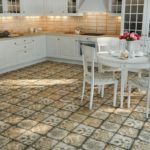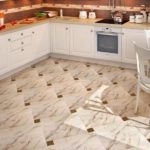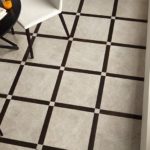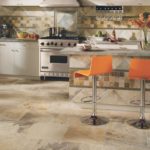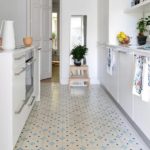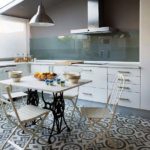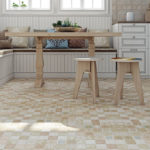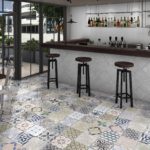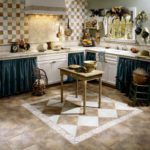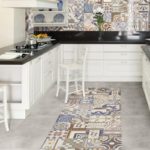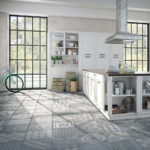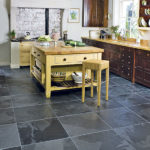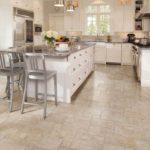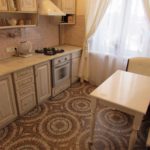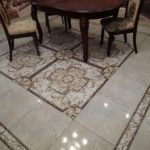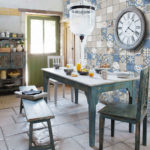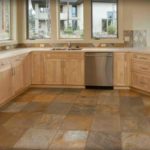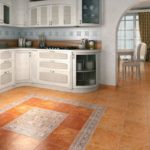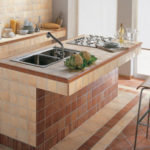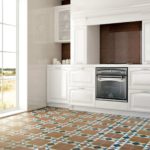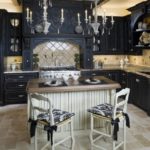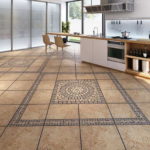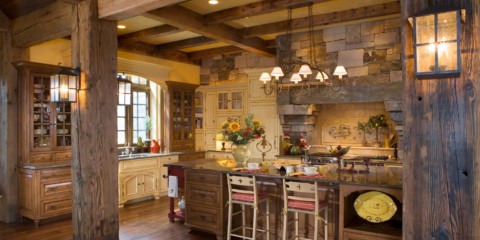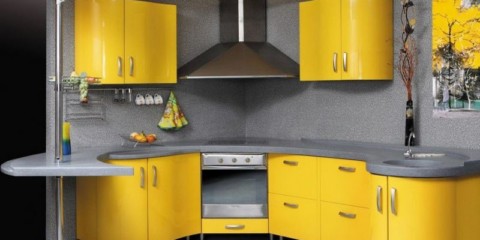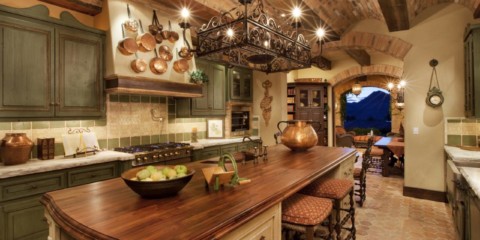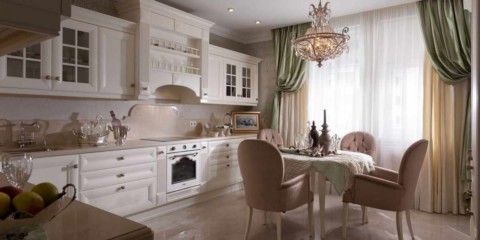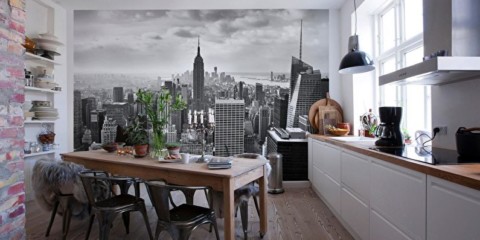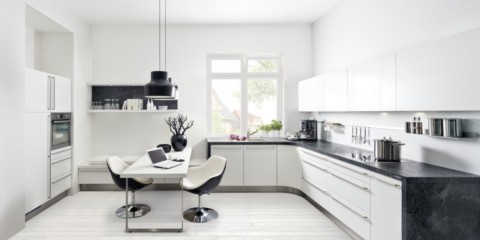 Kitchen
What could be the design of a white kitchen in the interior
Kitchen
What could be the design of a white kitchen in the interior
Repair of such a part of the apartment as the kitchen is a very important event. After all, it is most susceptible to mechanical stress, regular temperature changes, high humidity and the need to work with aggressive substances. This means that finishing materials will be given special attention, especially flooring. It is important that it can last for many years and cope with large loads affecting the floor surface.
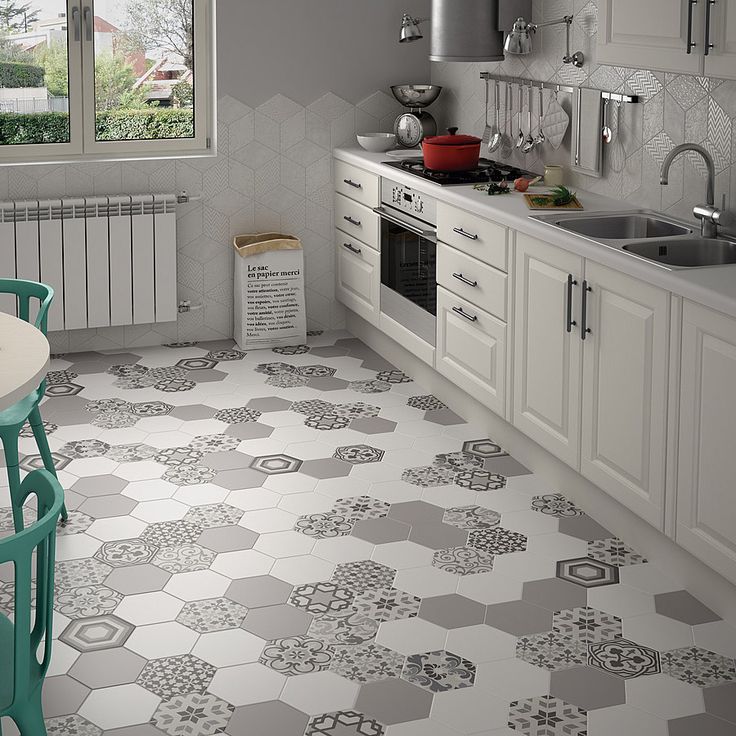
The flooring in the kitchen must be strong enough to withstand intense loads and aggressive detergents
Tiles are best suited for such purposes. However, before choosing this material, you need to find out more about its variety, technical characteristics and many other qualities.
Classification of floor tiles for the kitchen
Content
Floor tiles are on the market in a fairly wide range. To a person who does not understand this matter, at first, it may seem difficult to determine the suitable, and most importantly the correct, durable material. There are a large number of types of tiles that differ from each other both in their external, technical properties and the technology of their manufacture.
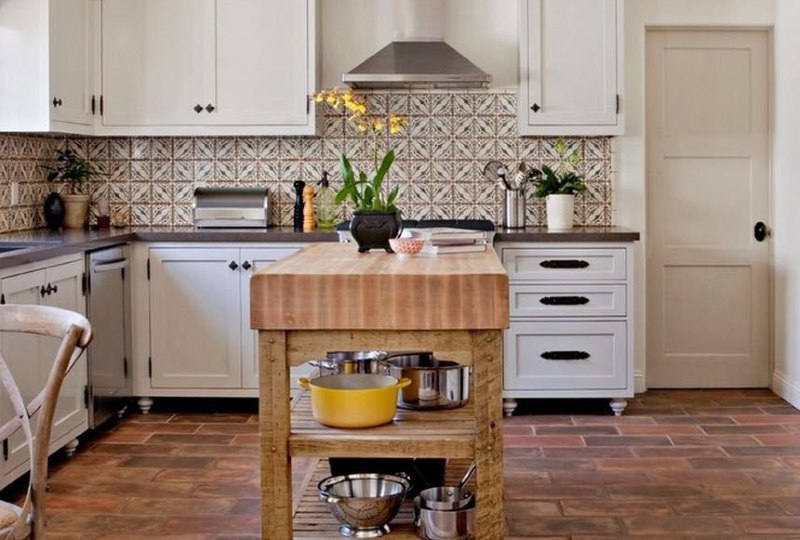
Matte tiles are the most durable, products with a glossy surface are always more fragile due to technological features
Ceramic tile
This material is presented in the following forms: Cotto, Clinker, Cottoforte, Metlakhskaya, Dimarmi and many others. It is made from various grades of clay and burned due to high temperatures.
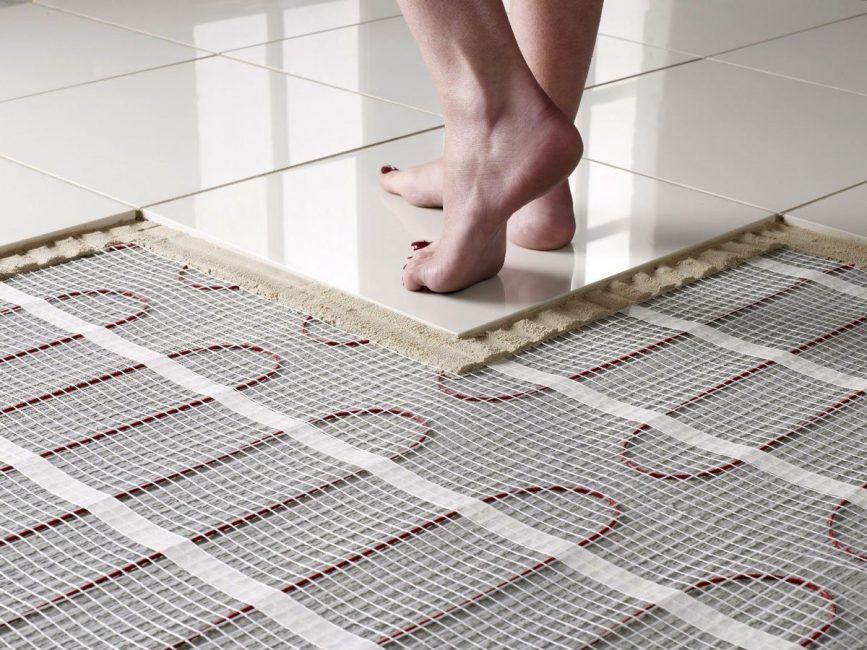
Ceramic tiles are often used for underfloor heating.
Table. Pros and cons of ceramic tiles
| Benefits | disadvantages |
| Natural material that does not harm the environment. | Ceramic tile laying requires extensive knowledge in this matter, since the process is very complex and time-consuming. |
| Absolutely hypoallergenic, the firing process ensures the absence of any allergens and makes tile safe. | |
| It does not allow bacteria, fungi to accumulate. | The need to perform a preliminary screed genderto prevent further fragility of the product. |
| Resistant to moisture, steam, water: the waterproof property allows you to set tile in the premises with high humidity. The appearance and characteristic properties do not spoil. | |
| Coating Your Glaze material prevents the accumulation of spots, grease, dirt, dust. It is not destroyed by exposure to cleaning chemicals. | May be too slippery for styling on the the kitchenTherefore, it will be necessary to think through all the nuances in advance. |
| Durable Proper installation guarantees flooring without repair and replacement for several decades. | |
| High strength will allow the installation of massive furniture, often move it. | The cost of such flooring is much higher than that of others (laminate, linoleum). |
| Does not lose color with prolonged use: does not respond to sunlight and other atmospheric influences. |
Advice! Suitable material for home decoration where small children and pets live.
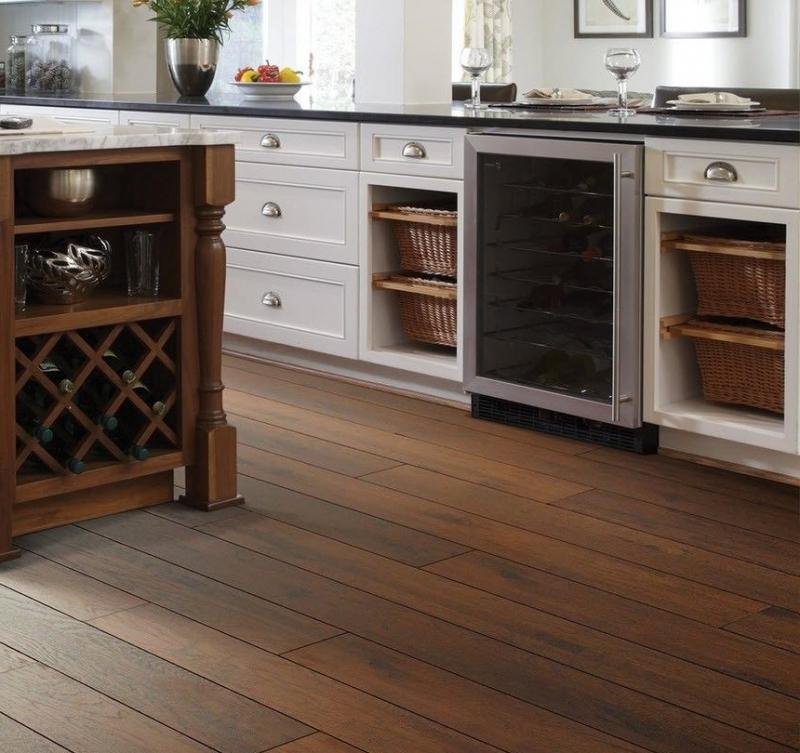
The most luxurious solution is ceramic wood.This coating looks very natural and really resembles wooden floors.
Porcelain Tile
Very strong and massive material. Able to endure conditions that even ceramic tiles will not withstand. A popular look for finishing a kitchen, especially a work area. It has such positive qualities as:
- resistance to high temperatures, as well as their differences;
- durable service;
- high hardness and strength;
- low water absorption;
- environmentally friendly material;
- possesses uniformly saturated color thanks to production technology;
- installation is easier than installing the previous version.
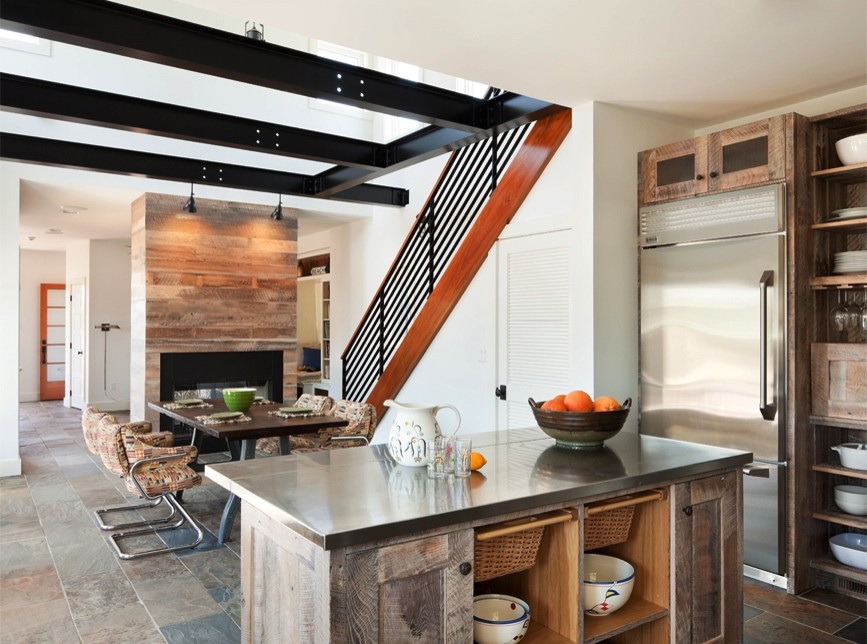
Porcelain tiles are suitable for any style of kitchen
Among the shortcomings, there is only one - high cost (justified by the quality of the product).
Important! The product has a slippery surface, so it will be necessary to resolve this issue if the need arises.
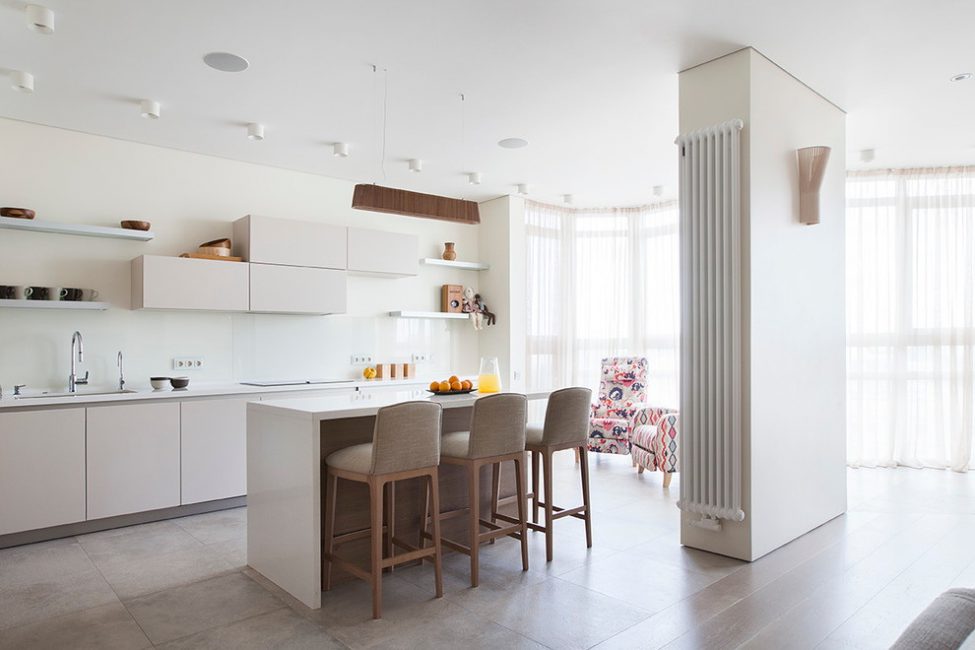
Kitchen floor must be safe to walk
Stone tiles
All the features of natural stone tiles are considered in the table:
| Description | Benefits | disadvantages |
| The coating is in demand due to its strength, durability and beauty.
It is made of durable natural materials: granite, marble, onyx, sandstone, slate, travertine. It has a noble and spectacular appearance. It is made as a natural stone tile, and an artificial analogue, which is almost in no way inferior to the first. |
High coefficient of strength, resistance to wear. | Cost in kind tiles still remained high, even a change in stone mining technology could not affect this issue. |
| The ability to not be exposed to accidental mechanical damage or impact. | ||
| Long operation. | Too much weight requires a very strong foundation. | |
| It has fireproof properties. | ||
| Resistance to the appearance of regular humidity, vaporization and rapid temperature changes. | ||
| Porous products absorb extraneous sounds well. | Some options tiles require special protection against moisture. | |
| High thermal conductivity will make it possible to install a "warm floor" system. |
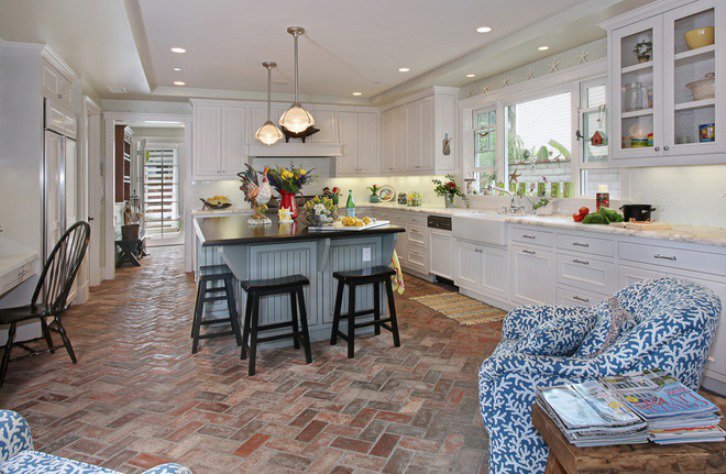
Herringbone stone tiles resemble classic parquet
Important! Before choosing this type of flooring, you need to make sure that the hygroscopicity indicator of the selected product is suitable for your kitchen. Because long-term accumulation of moisture can reduce strength and lead to further destruction.
Other types of coating
Separately, it is worth considering vinyl and glass tiles:
| Title | Description | Benefits | disadvantages |
| Glass tile | It is made by damping glass and adding amorphous, gaseous components. This allows the material to acquire transparency, heterogeneity. To get the necessary colors add dyes.
The product is not inferior in strength ceramic tile. It is safe, not afraid of water and chemicals, therefore it will not lose its appearance. |
Beautiful surface tiles will transform the interior the kitchen, with its help you can lay out picture. | The cost of a glass product is quite high, especially for the original and interesting design material. |
| It does not absorb odors, has excellent hygienic properties, due to which fungus and mold almost do not form. | |||
| The surface is resistant to mechanical stress, does not respond to sunlight (picture will remain the same even after a long time). | |||
| Option availability tiles with non-slip surface allows you to do on the kitchen safe flooring. | |||
| Vinyl tile | Combines the best qualities of linoleum (flexibility), natural stone (stability), laminate (simplicity and speed styling) It is able to imitate many materials for decoration: ceramics, leather, wood, granite, marble, sand, pebbles, grass.
Vinyl coatings are presented in: self-adhesive PVC tilecastle commercial appearance, adhesive coating of vinyl products. |
It has good water resistance, resistance to temperature extremes. | In any case, without a specialist, an ideal installation will be difficult to carry out, certain skills are needed. |
| Unpretentious in cleaning, not afraid of detergents. | |||
| It has a wide color palette and a variety of textures. | |||
| It will please you with an affordable price and a simple installation method, which can be implemented without outside help. | |||
| Absolutely non-slippery and fireproof. |
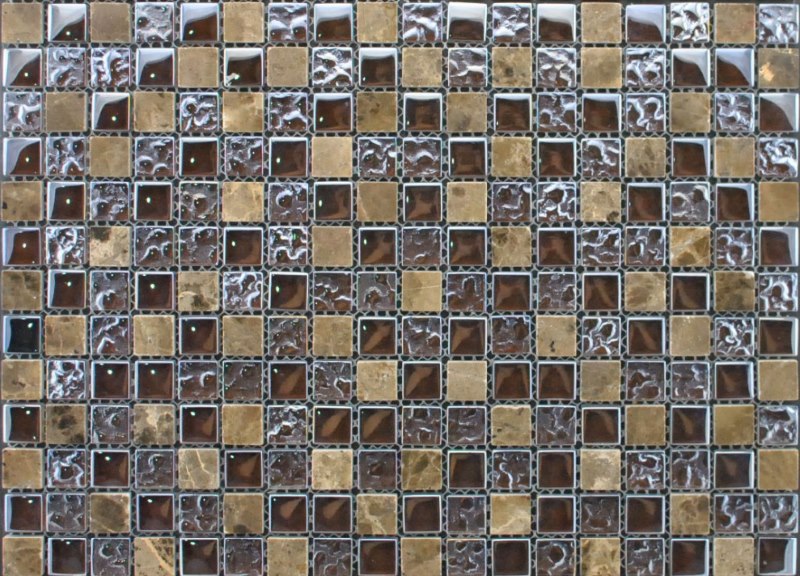
Glass tiles are often used as mosaic tiles.
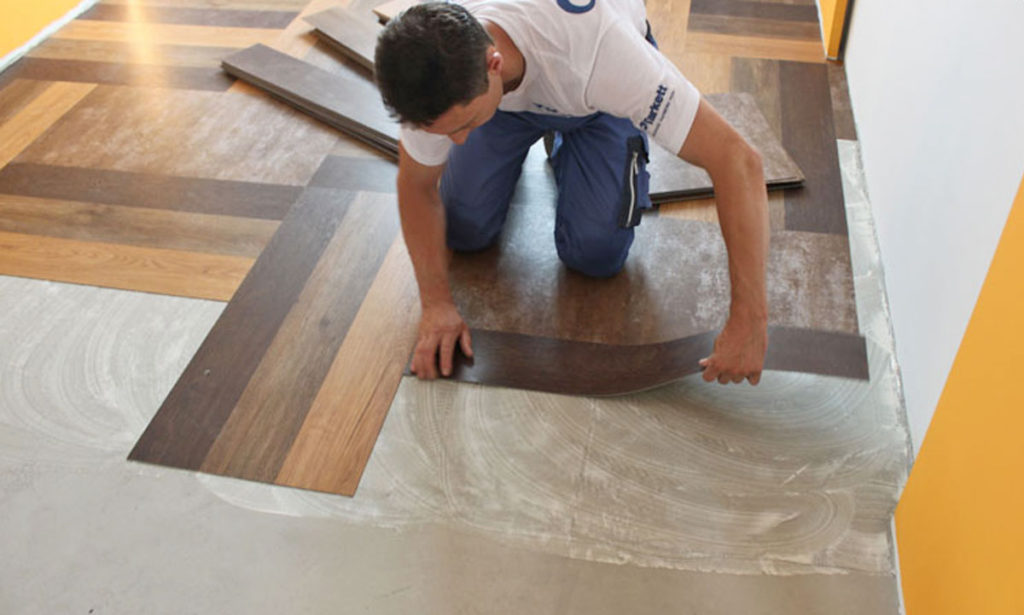
The wear resistance of vinyl tiles depends on the quality of the material. Expensive samples can last for decades
The nuances of choosing flooring
Before you buy decorative materials, you should calculate the size of the kitchen, first familiarize yourself with the product range and calculate the number of parts that will be needed for repairs.
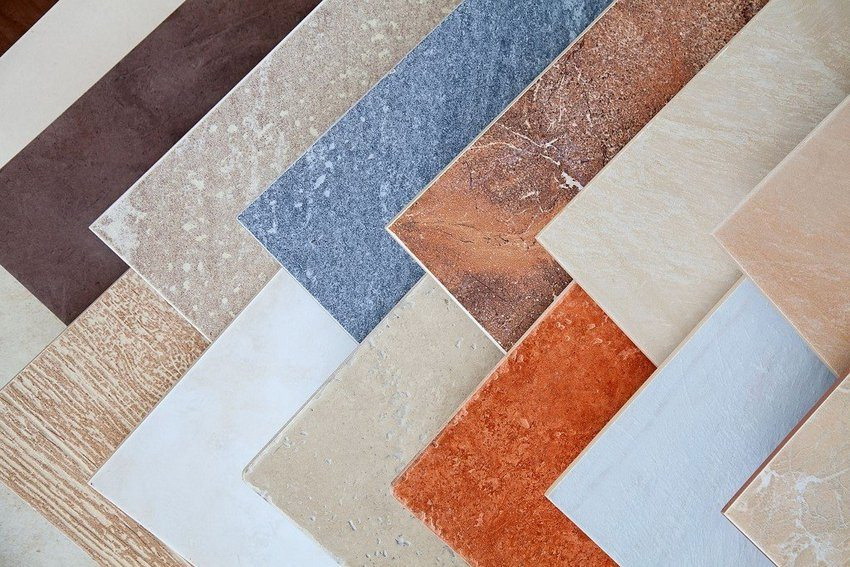
The color palette of the floor tiles is very large, you need to choose according to your taste and the overall design of the kitchen
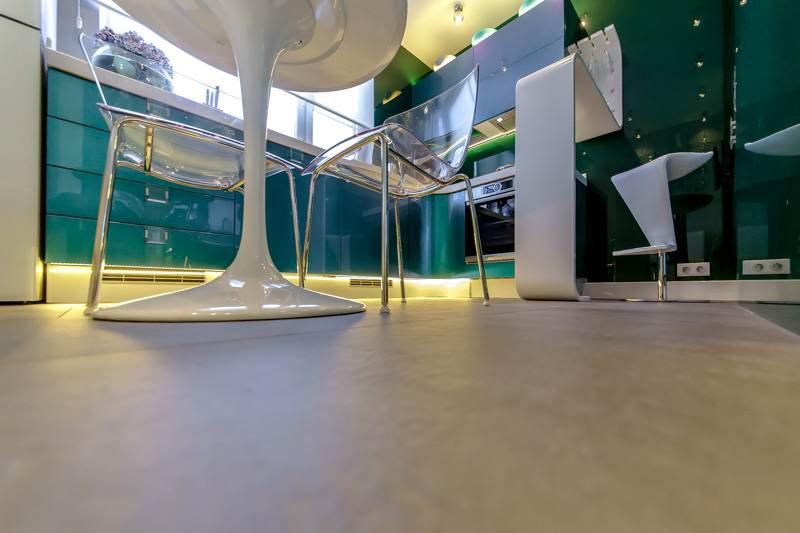
Choose the first grade of tile - the higher the grade, the lower the permissible reject rate. For comparison: in the first grade tile it is minimal - 5%, in the third - 25%
It is also necessary to pay attention to the batch of the selected tile, if you have to buy the missing items, you can make a mistake with the tone and size. This is due to the difference in material in different batches of the same collection.
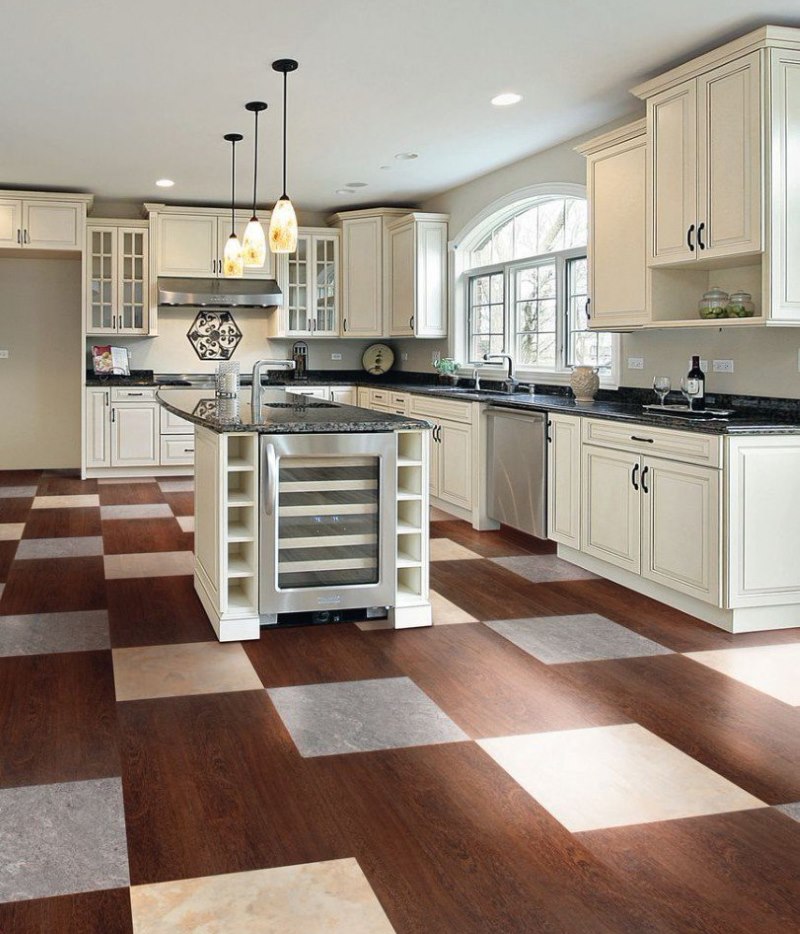
The size and format of the tile affects the cost and complexity of laying. The ideal option is that the side of the tile is a multiple of the length or width of the room, then you will need to cut the minimum number of products and laying will go faster
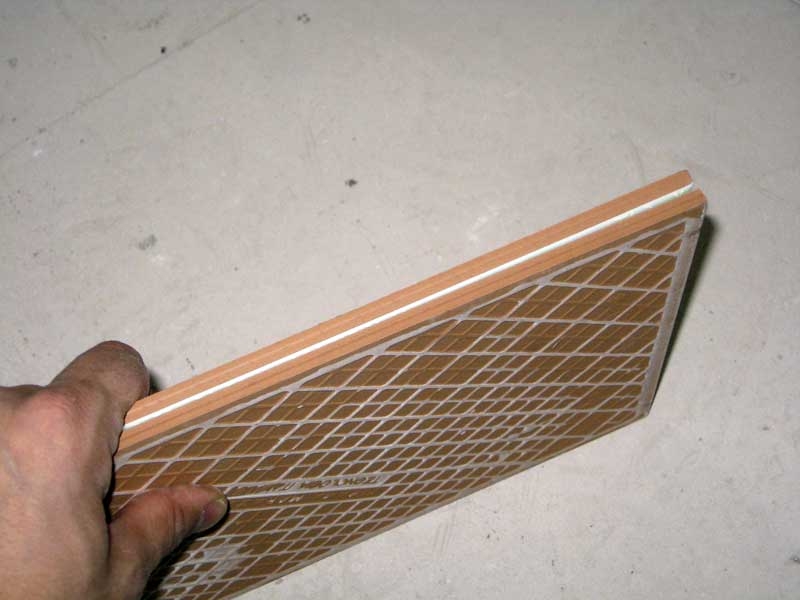
The impact strength depends on the thickness of the tile
Design of floor tiles for the kitchen
Choosing the right floor tile design is very important, as the whole kitchen interior directly depends on it. You should understand this issue and choose a suitable product design for flooring.
- The tiled floor is ideal for a miniature kitchen. It can visually increase the space and emphasize the advantages of the room.
- In a large kitchen, you can use both bright, dark tiles, and light. However, when choosing a coating of dark tones, it is necessary to consider that it is better to install furniture and a set of opposite shades.
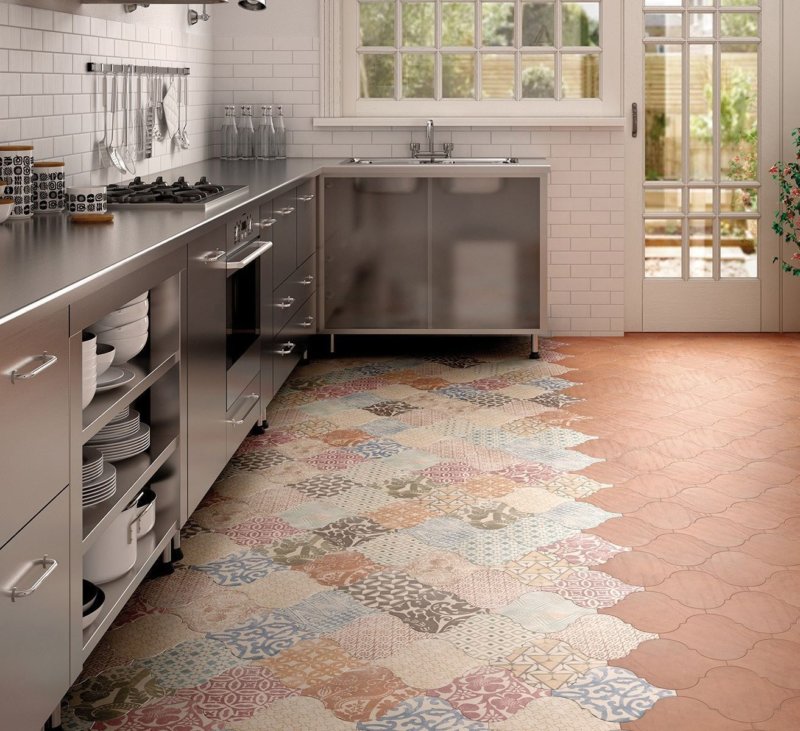
With the help of tiles of different designs, you can divide the kitchen into functional zones
- Warm tones should be used in a kitchen with windows facing north or west. Saturated cool colors are suitable for the "southern" room.
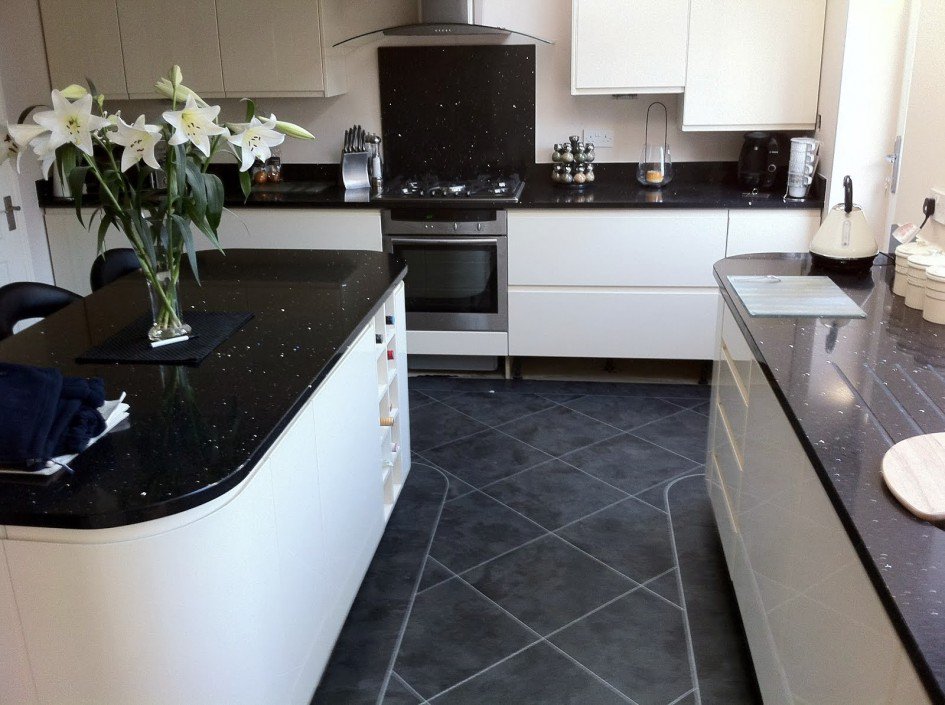
Dark tile blends well with light-colored grout
A good choice of material for each style of interior:
- High-tech and minimalism is suitable for tiles with an unobtrusive delicate pattern or a monophonic surface in light shades.
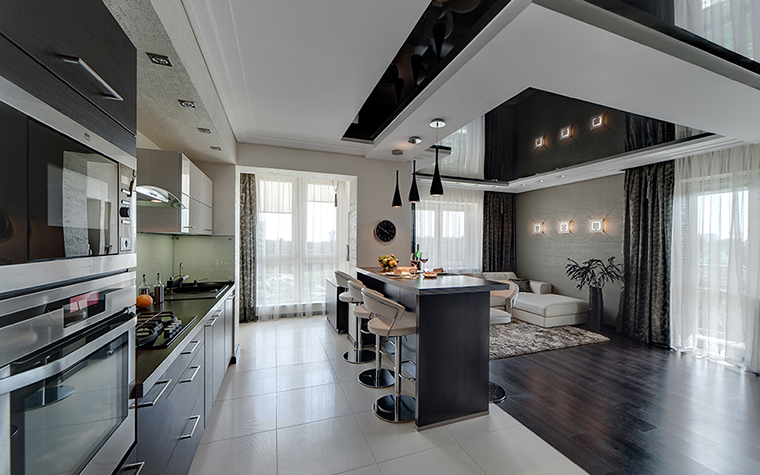
For modern technological styles, the use of large-format tiles with a smooth surface is typical
- The classic interior is complemented by marble, or antique-style tiles.
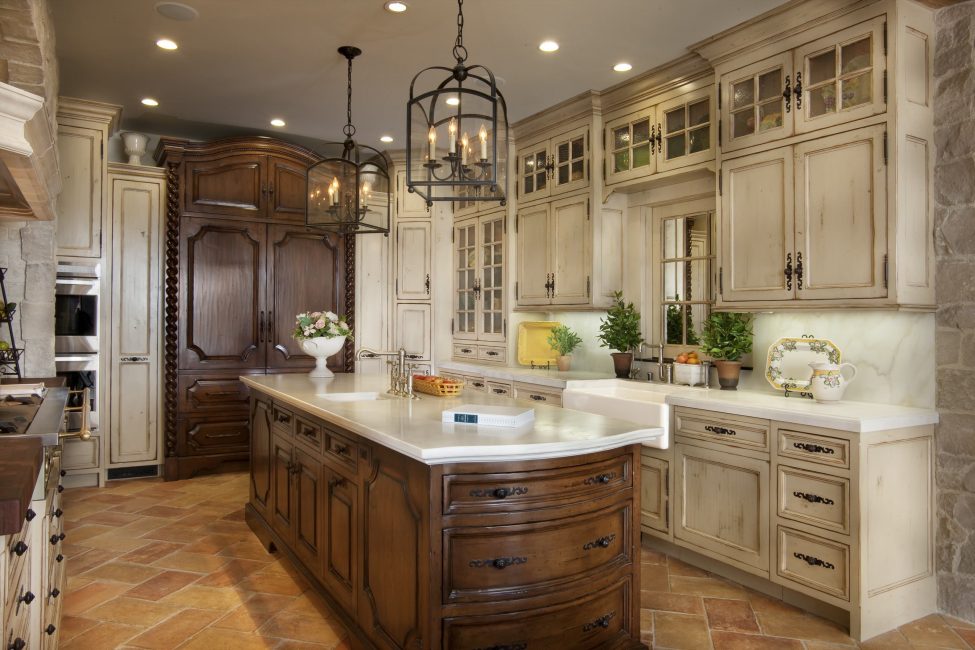
Brown-tiled stone tiles blend harmoniously into a classic interior with wooden furniture.
- Provence or country can decorate artificially aged items, possibly with imitation wood or stone.
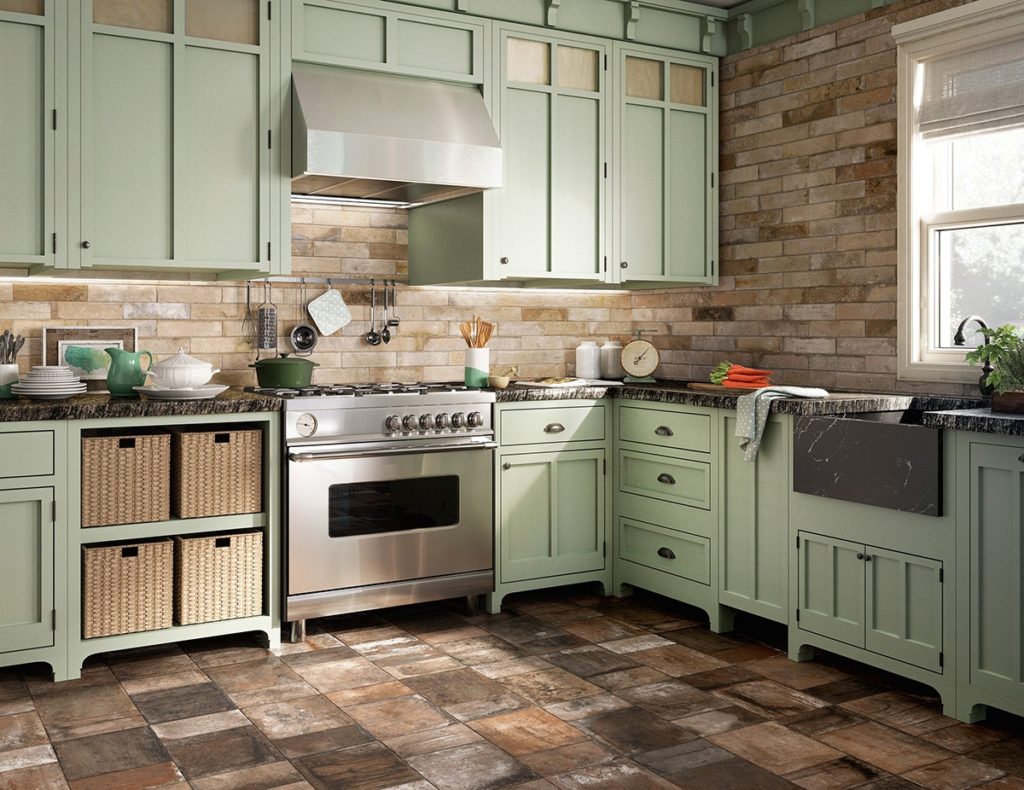
In "rustic" kitchens, the floor made of stone tiles looks stylish
- For a loft, a stone floor will become integral.
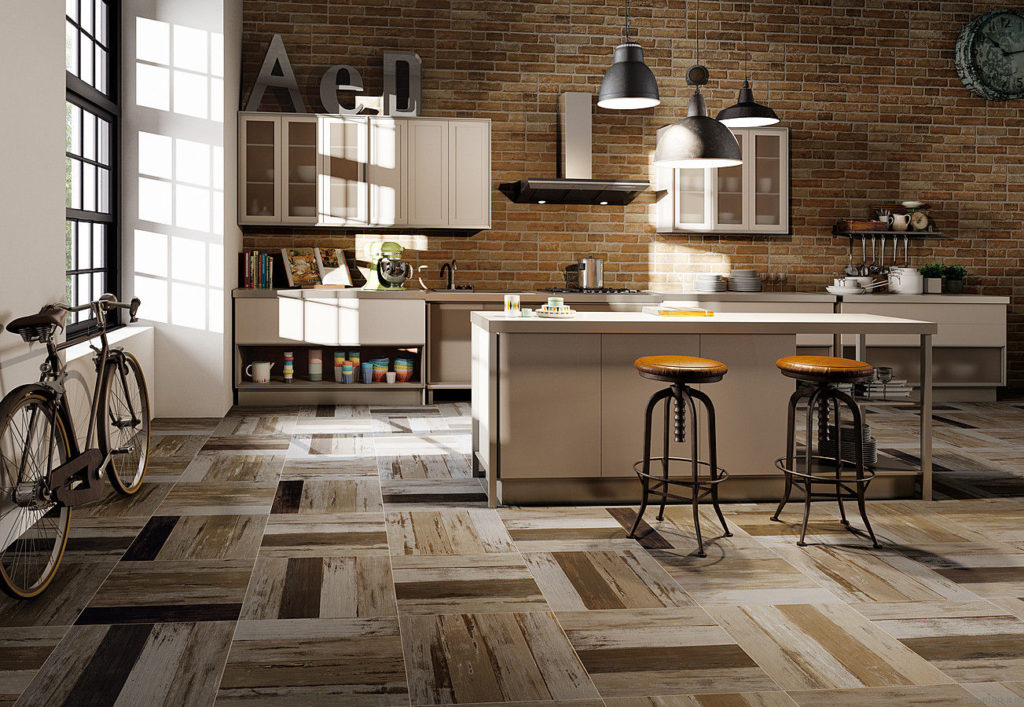
Interesting design decision for porcelain stoneware flooring in the loft style kitchen
Important! An interesting point is that the natural color scheme (shades of brown, beige, gray) allows you to create a non-marking floor. Great option for the kitchen.
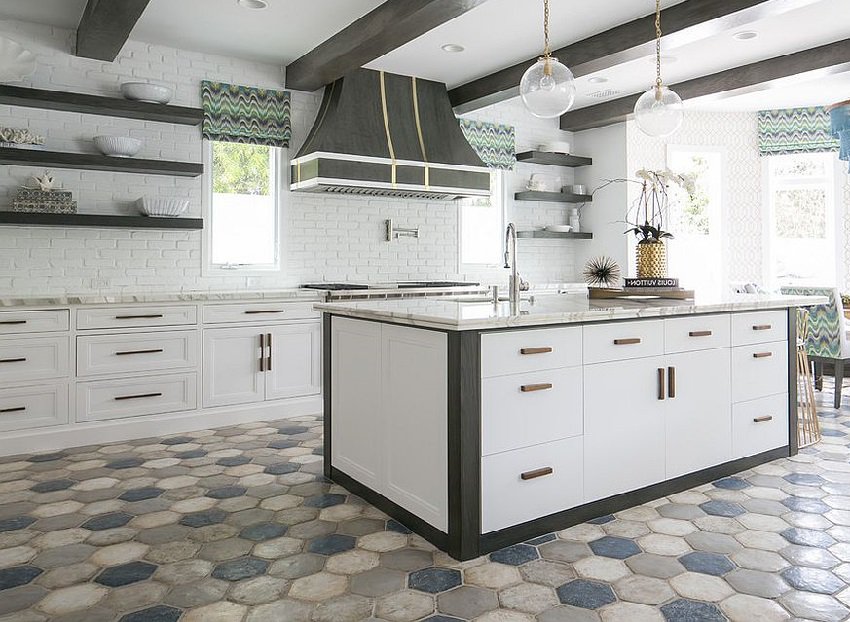
Tiled ornament will be the central decoration of the interior in a restrained color scheme
Rules for laying finishing material
First you need to carry out preliminary work.You will need to make sure that the floor is level, since the presence of an air gap between the tile and the floor will entail the destruction of the product in the future. Be sure to remove the old coating, then the new one should last much longer.
There are many options for installing floor tiles, among them:
- traditional;
- with offset;
- diagonally;
- herringbone;
- modular grid.
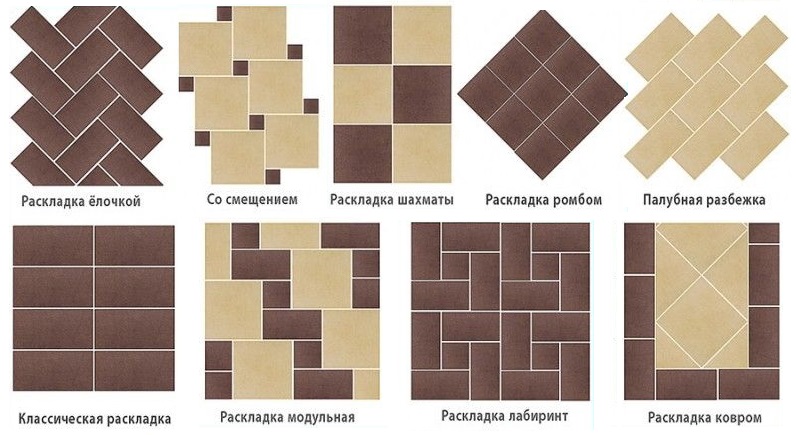
Options for laying tiles on the kitchen floor
Tiles laying steps:
- The floor is cleaned of debris, dust and any other contaminants.
- In most cases, the floor is screed so that the new product lies smoothly and is not damaged.
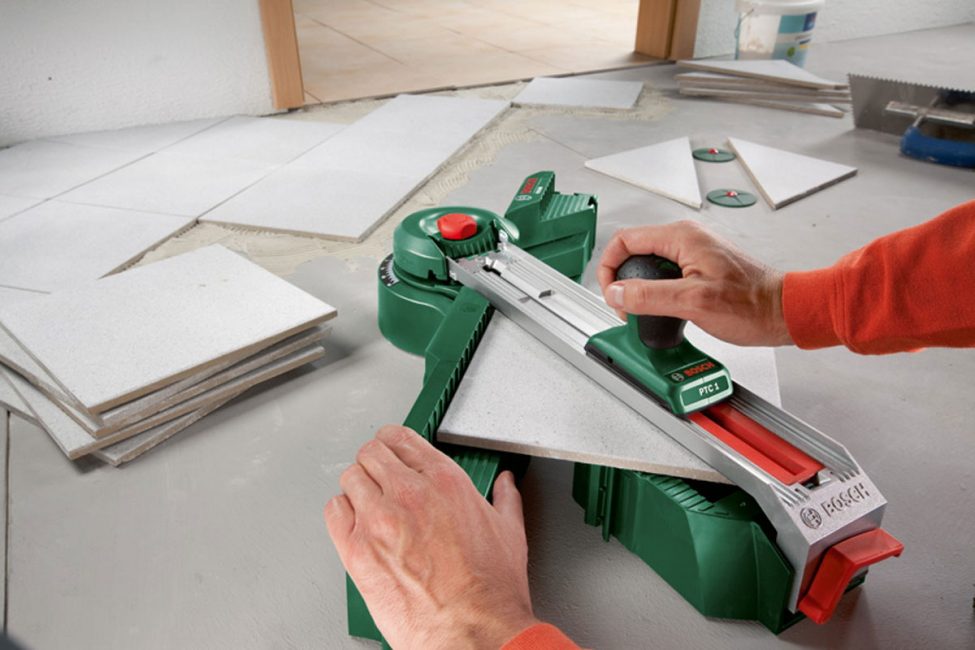
Use a special tool to trim the tiles.
- After preparing the adhesive composition.
- The adhesive solution is applied in a small layer. Furrows are drawn on top for better bonding of elements to the floor.
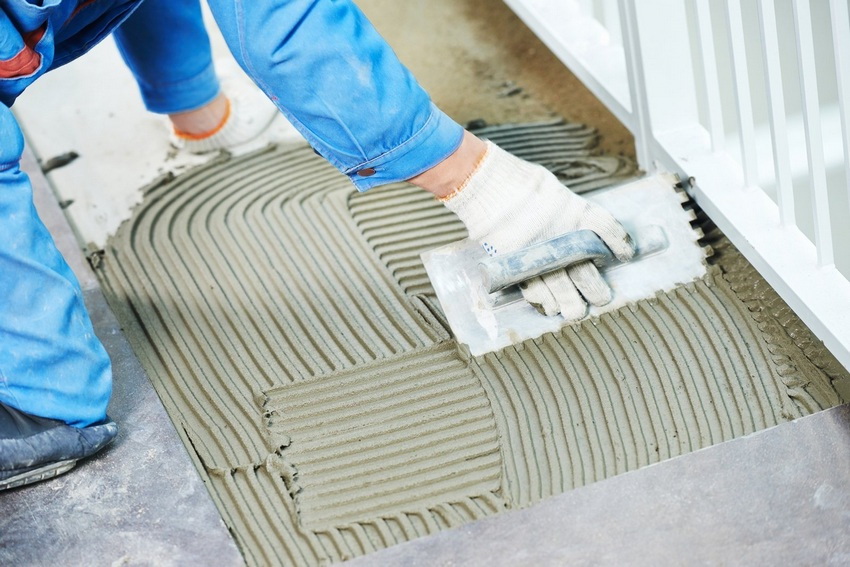
The solution is applied using a spatula with cutouts
- The tile is installed slowly and accurately, after which it is pressed. Around each part, special crosses are attached, which contributes to even styling.
- After complete drying, the crosses are removed and all the seams are overwritten with a pre-selected grout.
Advice! After completing the installation, a good idea would be to install a ceramic baseboard. He will be able to well complement the main coating will be an ideal finishing touch to the repair.
Tile Care
This material still requires minimal personal care. Otherwise, the tile may lose its attractive appearance and wear out quickly. Daily cleaning includes only washing the product with a sponge and warm soapy water. Some nuances when cleaning a particular type of coating exist:
- glossy tiles will not tolerate abrasive cleaning materials and hard metal brushes;
- regular cleaning with aggressive detergents can ruin the seams between the elements;
- to give the product shine, you can add a few tablespoons of ammonia to the cleaning solution;
- a couple of tablespoons of vinegar added to the water will help to easily remove stains of fat.
Proper care and selection of floor tiles from the very beginning will create a unique, stylish, comfortable kitchen that will delight the inhabitants of the house and guests for many years.
Suitable grout for the floor in the kitchen
The grout is selected in the tone of the tile, but often the seams are specially highlighted in bright color to emphasize the geometric pattern of the coating. If the floor consists of parts of different colors, then the grout is selected to match the larger items.
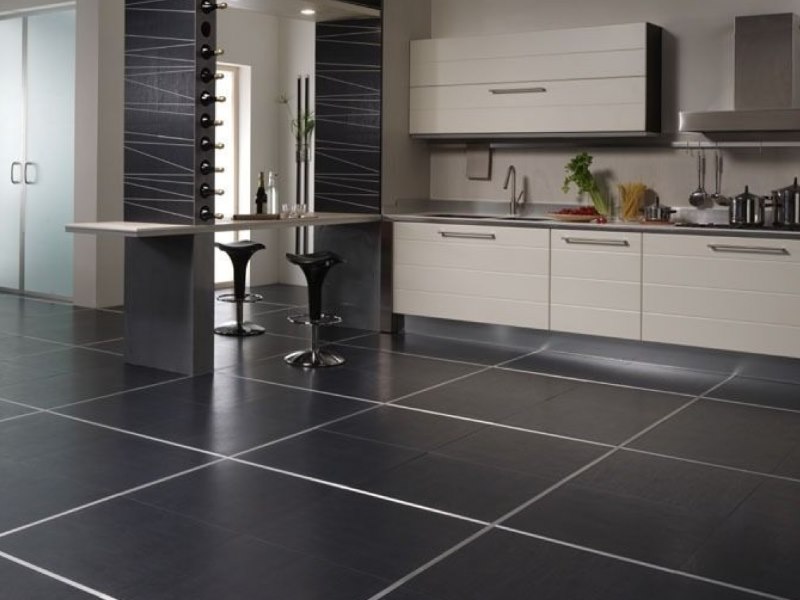
It is important that the grout contains special additives to prevent mold or mildew.
The joints between the tiles are processed with two types of grouts:
- Epoxy is several times stronger than cement, has a water-repellent effect, does not absorb dirt, and prevents the appearance of fungi. However, its cost is high and working with it is much more difficult.
- Cement grout is not so bad, if the surface is treated with a special protective compound and sealant, it will become equal to the previous version. The advantage of this grout will be its pricing policy and ease of working with it.
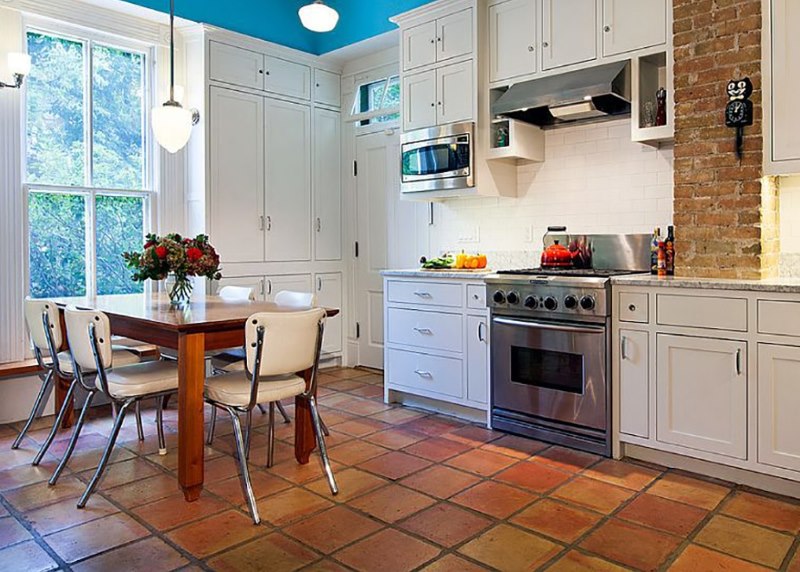
Grout should be selected based on the design of the floor. You must admit that gray cement joints look much more appropriate on the stone floor.
Video: tiles on the kitchen floor
